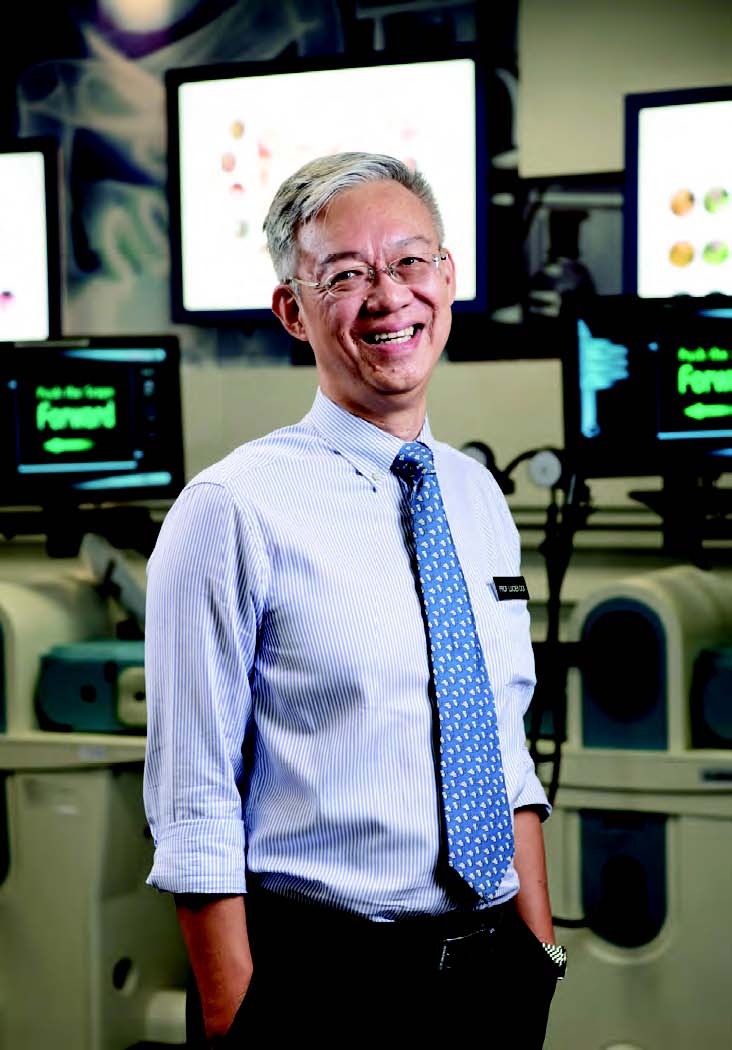
Professor London Ooi has spent more than 30 years as a surgeon, researcher, administrator and teacher at SGH. But his true legacy might be as a mentor extraordinaire to successive generations of surgeons and clinicians, many of whom bear witness to his generous and inspiring leadership.
His office at the Academia speaks volumes about Professor London Lucien Ooi’s role as a mentor. Brimming with photos, cards and personal notes, it is testimony to the many lives he has touched in his more-than-three-decades-long career at the Singapore General Hospital (SGH).
But it is the door to his room that speaks the loudest about Prof Ooi as a teacher and mentor. He deliberately keeps it open at all times – a welcoming sign to anyone who needs to see him.
“Leaving it open shows that you’re approachable, and so are better able to receive people,” said this year’s National Medical Excellence Awards’ Outstanding Clinician Mentor.
His approachability is cited often by students and colleagues alike. Friendly and generous to a fault, he seldom if ever refuses students’ requests for pre-examination tutorials. For his part, Prof Ooi said he is more than happy to oblige. Still, he stressed it’s not enough to teach or impart knowledge.
“If I teach somebody, I’m only passing on my skills and knowledge, but I don’t actually pass on values. We must also teach values because only then do we know when to apply those skills correctly,” said Prof Ooi, who is also Senior Consultant, Department of Hepatopancreato-biliary Surgery, SGH.
“A mentor must be a good role model, living the life of a good doctor first – not just in possessing skills, but in how you treat patients, how you treat people. The values must be seen as something they themselves would want to also have.”
In this respect, it is Professor Russell Strong, the well-respected Australian surgeon who performed the world’s first live donor liver transplant, that Prof Ooi considers his “real mentor”. Besides learning about perseverance, direction and focus, key for Prof Ooi was in seeing how Prof Strong “always put his patient first, no matter what”.
“If you mentor the person right, he will adopt the same values as you over time. He will then be ready to mentor the next generation,” said Prof Ooi.
The mentor-mentee relationship must be built on trust and confidence. “The mentee must trust that his mentor will care enough for him to teach and guide him well,” he said.
For a mentor to be comfortable in imparting knowledge generously, he must be competent himself. Only then can he have the confidence and magnanimity to pass on all he knows. Otherwise, the teacher might hold back some knowledge for fear of being overtaken by his students, he said.
 Prof Ooi also looked to providing infrastructure for training, playing a heavy role in designing the skills simulation laboratories at the Academia, and engaging industry players to provide top-of-the-line, state-of-the-art instruments and operating theatre systems for training students.
Prof Ooi also looked to providing infrastructure for training, playing a heavy role in designing the skills simulation laboratories at the Academia, and engaging industry players to provide top-of-the-line, state-of-the-art instruments and operating theatre systems for training students.
“We saw the importance of technology in healthcare, and thought that if we were not at its forefront, our trainees would never move forward,” he said.
Prof Ooi was instrumental in establishing entities like SingHealth Transplant as a platform for developing and mentoring clinicians in leadership roles in transplantation; and SingHealth Tissue Repository as a powerful resource for clinician researchers.
Prof Ooi’s appointments on advisory boards outside of Singapore underscore his international standing and repute. But perhaps Dr Tan Hiang Khoon, his successor as Surgery Division Chairman, puts it best when he hails Prof Ooi as “a true academic surgeon” – someone who excels in clinical expertise, research, teaching and administration, and combines all to be the mentor extraordinare.













 Get it on Google Play
Get it on Google Play